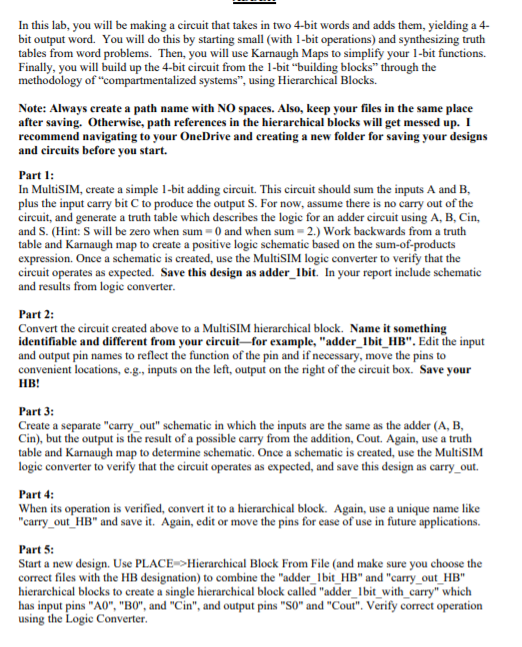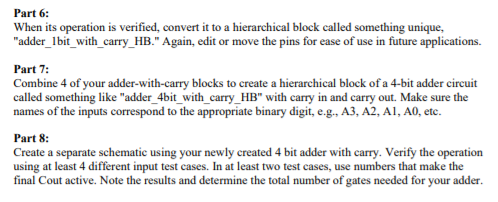

In this lab, you will be making a circuit that takes in two 4-bit words and adds them, yielding a 4- bit output word. You will do this by starting small (with 1-bit operations) and synthesizing truth tables from word problems. Then, you will use Karnaugh Maps to simplify your 1-bit functions. Finally, you will build up the 4-bit circuit from the 1-bit "building blocks through the methodology of compartmentalized systems, using Hierarchical Blocks. Note: Always create a path name with NO spaces. Also, keep your files in the same place after saving. Otherwise, path references in the hierarchical blocks will get messed up. I recommend navigating to your OneDrive and creating a new folder for saving your designs and circuits before you start. Part 1: In MultiSIM, create a simple 1-bit adding circuit. This circuit should sum the inputs A and B, plus the input carry bit C to produce the output S. For now, assume there is no carry out of the circuit, and generate a truth table which describes the logic for an adder circuit using A, B, Cin, and S. (Hint: S will be zero when sum = 0 and when sum=2.) Work backwards from a truth table and Karnaugh map to create a positive logic schematic based on the sum-of-products expression. Once a schematic is created, use the MultiSIM logic converter to verify that the circuit operates as expected. Save this design as adder_lbit. In your report include schematic and results from logic converter. Part 2: Convert the circuit created above to a MultiSIM hierarchical block. Name it something identifiable and different from your circuit--for example, "adder_lbit_HB". Edit the input and output pin names to reflect the function of the pin and if necessary, move the pins to convenient locations, e.g., inputs on the left, output on the right of the circuit box. Save your HB! Part 3: Create a separate "carry_out" schematic in which the inputs are the same as the adder (A, B, Cin), but the output is the result of a possible carry from the addition, Cout. Again, use a truth table and Karnaugh map to determine schematic. Once a schematic is created, use the MultiSIM logic converter to verify that the circuit operates as expected, and save this design as carry_out. Part 4: When its operation is verified, convert it to a hierarchical block. Again, use a unique name like "carry out_HB" and save it. Again, edit or move the pins for ease of use in future applications. Part 5: Start a new design. Use PLACE->Hierarchical Block From File (and make sure you choose the correct files with the HB designation) to combine the "adder_1bit_HB" and "carry_out_HB" hierarchical blocks to create a single hierarchical block called "adder_lbit_with_carry" which has input pins "AO", "BO", and "Cin", and output pins "SC" and "Cout". Verify correct operation using the Logic Converter Part 6 When its operation is verified, convert it to a hierarchical block called something unique, "adder_lbit_with_carry_HB." Again, edit or move the pins for ease of use in future applications. Part 7: Combine 4 of your adder-with-carry blocks to create a hierarchical block of a 4-bit adder circuit called something like "adder_4bit_with_carry_HB" with carry in and carry out. Make sure the names of the inputs correspond to the appropriate binary digit, e.g., A3, A2, A1, AO, etc. Part 8: Create a separate schematic using your newly created 4 bit adder with carry. Verify the operation using at least 4 different input test cases. In at least two test cases, use numbers that make the final Cout active. Note the results and determine the total number of gates needed for your adder








